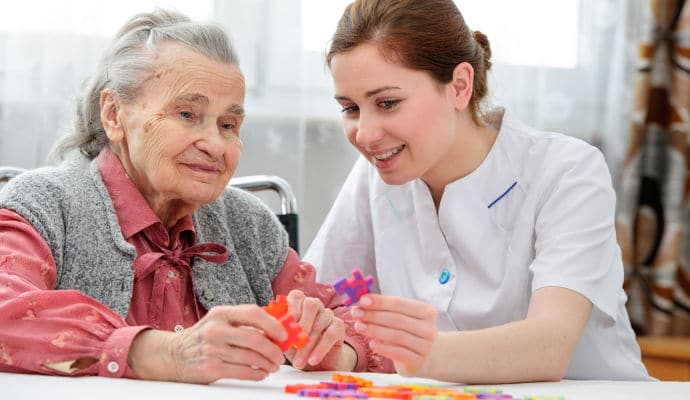Individualized Solutions for Families Looking For Alzheimers Care Charlotte
Individualized Solutions for Families Looking For Alzheimers Care Charlotte
Blog Article
Creating a Safe and Encouraging Environment for Alzheimer's Treatment
The development of a risk-free and supportive setting for individuals with Alzheimer's is paramount in boosting their lifestyle. This involves not just physical adaptations within the home, such as lessening threats and including familiar components, but likewise the implementation of structured regimens and meaningful tasks that deal with their cognitive requirements. Understanding the mental and emotional measurements of care can substantially influence their sense of safety and link. Exploring these diverse strategies can reveal important insights into efficient caregiving methods that might change the everyday experiences of both clients and caretakers.
Understanding Alzheimer's Needs
Frequently, individuals with Alzheimer's illness display a variety of requirements that need tailored strategies to care. As the condition progresses, cognitive decrease shows up in different methods, affecting memory, reasoning, and even the ability to perform day-to-day tasks. Caregivers should recognize these evolving demands to give proper support and ensure a better of life for those impacted.
One vital element of recognizing Alzheimer's demands is identifying the significance of routine and knowledge. People typically discover comfort in well-known patterns, which can minimize anxiety and complication. Caregivers ought to aim to develop structured daily schedules that include significant tasks aligned with the individual's abilities and interests.
In addition, efficient interaction is vital. Individuals with Alzheimer's might have a hard time to share themselves or comprehend complex language. Caregivers need to employ easy, clear language, usage non-verbal cues, and practice active listening to cultivate understanding and link.
Caregivers ought to motivate involvement in area activities or household events, promoting a feeling of belonging and purpose. Comprehending these diverse needs is necessary for creating an encouraging treatment atmosphere.
Creating a Safe Home
Creating a risk-free home for people with Alzheimer's illness is necessary to promoting and minimizing threats freedom. The design of the living space must prioritize security while enabling individual comfort. Get rid of potential risks such as loosened carpets, sharp things, and clutter, which can lead to drops or mishaps. Ensure that pathways are well-lit and clear, as correct lighting decreases disorientation and enhances flexibility.
Integrating flexible functions is likewise crucial. Mount grab bars in restrooms and near stairs, and think about using non-slip mats in damp areas. Additionally, using different shades for floors and walls can assist in differentiating rooms, assisting to mitigate confusion.
Experience is necessary for individuals with Alzheimer's. Personalizing the atmosphere with acquainted things and pictures can strengthen a feeling of belonging and safety - Alzheimers Care Charlotte. It is also useful to have actually an assigned location for day-to-day tasks, such as reading or crafting, which can give framework to their day
Last but not least, applying a secure exterior area allows for safe exploration while getting in touch with nature. By attentively making the home setting, caregivers can considerably boost the lifestyle for individuals coping with Alzheimer's disease.
Enhancing Interaction Abilities

Non-verbal interaction, consisting of faces, gestures, and touch, plays an essential function in conveying compassion and understanding. Keeping eye get in touch with and a calm attitude can enhance the comfort level of the person, advertising a sense of safety.
Moreover, it is crucial to practice active listening. This involves being completely present, revealing patience, and enabling the individual to share themselves without interruption. Repetition may be needed; caretakers must be prepared to review subjects or inquiries, as people with Alzheimer's might fight with memory recall.
In addition, utilizing visual help that site or hints, such as pictures or acquainted things, can assist in recognition and involvement. Ultimately, improving communication abilities has to do with building trust and creating an environment where people feel heard, valued, and comprehended, consequently improving their lifestyle.
Motivating Social Interaction
Cultivating purposeful social interactions can considerably enhance the wellness of people with Alzheimer's illness. Engaging with others not just assists fight sensations of isolation however additionally promotes cognitive feature and emotional health and wellness. Structured social tasks, such as group crafts, arts and games, or songs therapy, create possibilities for homeowners to get in touch with peers and caretakers, which can cause enhanced state of mind and reduced anxiousness.
Developing an inviting atmosphere that encourages socialization is necessary. This can be achieved by preparing common rooms that assist in communication, such as comfy seating areas or activity rooms. Furthermore, including familiar and culturally relevant activities can stimulate memories and urge engagement, allowing people with Alzheimer's to feel even more connected to their previous experiences.
Additionally, caregivers should be trained to identify and promote social involvement among homeowners. By focusing on social interaction, we can significantly improve the lives of those living with Alzheimer's, promoting a feeling of neighborhood and belonging.
Supporting Caretaker Wellness

To support caretakers, companies ought to use normal training and educational resources to boost their understanding of Alzheimer's disease and caregiving methods. Supplying accessibility to reprieve treatment solutions enables caretakers to take needed breaks, minimizing anxiety and fatigue - Alzheimers Care Charlotte. Furthermore, promoting an area via support system can facilitate emotional sharing and the exchange of useful guidance among caregivers, producing a network of shared support
Mental wellness sources, such as therapy solutions, can additionally be essential in addressing the emotional toll caregiving can take. By focusing on caretaker well-being, we develop a more lasting caregiving environment that not just benefits the caretakers themselves however likewise boosts the overall high quality of care obtained by people with Alzheimer's. Ultimately, sustaining caretakers is a vital visit this website part in cultivating a effective and caring treatment setup.
Verdict
Finally, the development of a encouraging and safe environment for individuals with Alzheimer's is important to improving their top quality of life. By focusing on security through thoughtful design, fostering psychological wellness with acquainted elements, and promoting involvement through structured regimens, caregivers can considerably influence the general experience of those affected by this problem. Additionally, supporting caretaker wellness is crucial, as it inevitably contributes to an extra reliable and caring care atmosphere.
Rep might be needed; caretakers should be prepared to take another look at questions or subjects, as people with Alzheimer's might have a hard time with memory recall.

Report this page